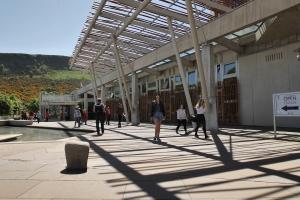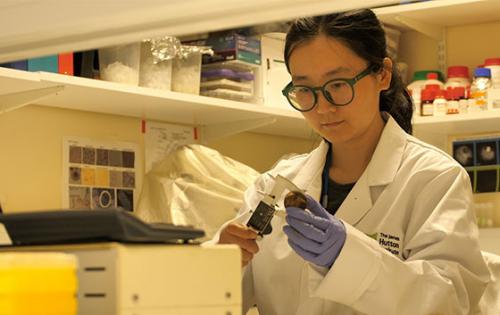
Globally we face significant challenges such as food security, climate change, biodiversity loss and changing geo-political factors. The need for innovation through new technology and practices has never been greater. Our projects directly develop useful tools and also create practices that enable stakeholder-researcher collaboration for innovation. Innovation is supported through Scottish Government's Underpinning of National Capacity and Research facilities within SEFARI and through individual strategic research and reactive projects. Examples include: the creation of the Conservation of Genetic Diversity tool kit; development of novel and underused crops; livestock breeding, plant breeding, livestock and plant disease diagnostics, livestock vaccines, virtual research-engagement tools and much more.
Sector Contact

Case Studies
Scientists at The James Hutton Institute are spearheading cutting-edge research to support the UK’s National Action Plan for pesticide reduction, combining AI, big data, and biology to revolutionise Integrated Pest Management (IPM) in Scotland. From forecasting potato virus risks to advancing biological alternatives to conventional pesticides, their work helps farmers target pesticide use while safeguarding yields and the environment. Underpinned by RESAS funding, this science-driven approach is reshaping pest management, ensuring sustainable farming and future-proofing Scotland’s vital agricultural sector.
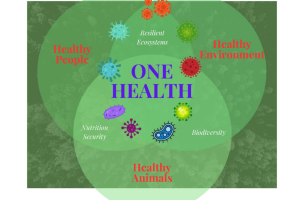
Antimicrobial resistance is an emerging threat to the health of animals and humans in Scotland and around the world. SEFARI scientists at the Rowett Institute have made some early, exciting findings that may prove invaluable in the global battle to hold back the spread of anti-microbial resistance. This blog post discusses the ongoing Scottish Government’s RESAS funded studies that are identifying environmental bacterial isolates that are showing promise for development as probiotics to inhibit antibiotic resistant bacteria across different ecosystems.
Illustration: Microbial ecosystems and One Health (Credit: authors)
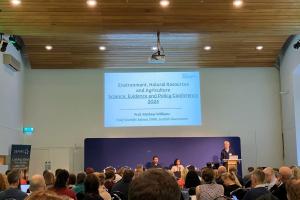
Climate Change Adaptation is one of the key items on the policy agenda in Scotland, and this was the main focus at this year’s ENRA Science, Evidence and Policy conference.
Organised by the Scottish Government’s Rural & Environmental Science and Analytical Services (RESAS) and held at Edinburgh’s Dynamic Earth, the conference brought together researchers and policymakers from across the rural and environment research and policy landscape in Scotland and showcased Scottish Government (RESAS) funded research evidence that is supporting climate change adaptation.
Title Image: Opening keynote by Prof Mathew Williams (Photo by Alöna Roitershtein)
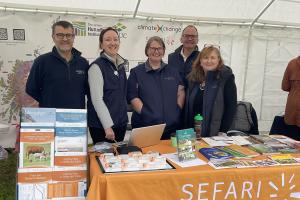
During this year’s GO Falkland gathering, in the foothills of the mighty East Lomond Hill on the beautiful Falkland estate, an enthusiastic collective of farmers, growers, artists, scientists and policymakers came together to discuss what Regenerative Farming, Forestry, Land Use and Food means for them. During the event, we shared experiences and insight to collaboratively work towards the shared goals of the sustainable future.
SEFARI and SEFARI Gateway were there to contribute to and support these conversations over the two days. Find out more in this blog.
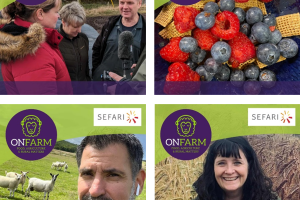
What do hemp, barley, antimicrobial resistance and soft fruits have in common? They are the episode themes for a series of podcasts that SEFARI and SEFARI Gateway has created in partnership with OnFARM. So, if you’re a farmer, grower, food producer or simply interested in the science behind what we eat and where it comes from, then this is the 4-part series for you. Enjoy!
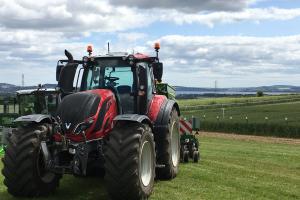
On the 4th of July Arable Scotland returns for the 5th year, a field event which is becoming a firm favourite in the calendar with everyone interested in food production. Farmers, producers, researchers and the policy community come together to discuss key issues such as innovative and sustainable farming.
SEFARI researchers and SEFARI Gateway colleagues will be joining in the conversations at Arable Scotland again. In this blog, find out more about which colleagues will be there and how our research is supporting the arable sector.
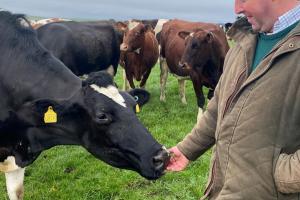
Fineview, a dairy farm managed by the Clark family in Dumfries and Galloway, is part of the innovative First Milk dairy cooperative which aims to deliver healthy fresh milk on sound environmental principles. Why not take a virtual tour and hear how delivering quality milk products needs a nurtured healthy soil, the encouragement of biodiversity, healthy cows and a sustainable farm enterprise.
This virtual tour is one of a series of SEFARI Gateway Innovative Knowledge Exchange funded tours designed to provide you with access to the many research facilities across Scotland whilst also giving you a taste of some of the work we do. Across SEFARI, world leading pioneering research is being undertaken that can really make a difference on the ground.

With growing pressures on food resources, agricultural inputs (e.g., energy, soil, water), production costs and the environment, many of us are looking at how we can reduce food wastage whilst still ensuring we get adequate nutrition.
In this blog. Madalina and Marietta - research fellows at the Rowett Institute, discuss work they’ve been doing to establish if broad bean hulls could be reused as food/food ingredients, in a bid to deliver circular nutrition (reusing food waste and providing needed dietary nutrients) as a zero-waste solution. It is hoped such approaches could contribute to a greener economy and a balanced diet simultaneously.
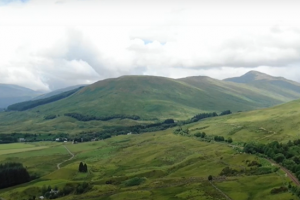
With the UN Climate Change Conference (COP26) underway, there is a spotlight on initiatives being taken by countries to address climate change. Do you want to know what Scotland is doing about it? Then join us on a virtual tour of some of SEFARI’s fascinating climate research.
From exploring windy Aberdeen Bay to visiting Scotland’s marshy peatlands, the tours offer a behind the scenes look at some of our innovative research which is seeking to help Scotland address and adapt to the climate crises. What’s more, you can enjoy the experience from the comfort of your own sofa and at your own pace.
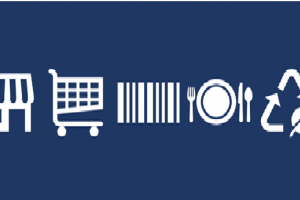
An emergent model of food redistribution, social supermarkets (SSMs), hold considerable potential for facilitating social development in deprived areas while diverting food waste. SSMs take high quality surplus food, not sellable in the mainstream market, and provide it to low-income consumers for greatly discounted prices in a more dignified shopping experience.
In this blog, Aiden Berri and Luiza Toma discuss how their research has found consumers’ intentions to use a SSM are influenced by a variety of factors which combine their food insecurity and food waste attitudes.
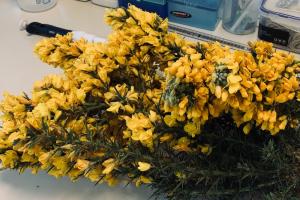
Agriculture bears the brunt of having to reliably supply food, ensure its own economic viability, while complying with environmental concerns. Farming comes under a lot of pressure to deliver produce, despite unfavourable climatic variation, changes in pest behaviour and the control of invasive plants.
In this blog, Ajay Iyer and Wendy Russell consider a different approach and discuss how invasive or “undesirable” plants such as Gorse (Ulex europaeus) could serve as an alternate and sustainable source of protein.
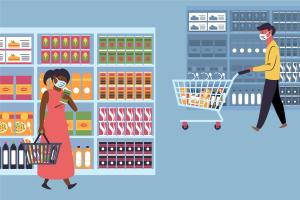
Since March 2020, attempts to control the spread of COVID-19 have led to substantial and far-reaching changes to everyday life, with social restrictions of varying severity imposed, relaxed, and reimposed over the intervening 12 months. With habitual dietary intake largely dependent on environmental cues, significant changes in our typical lifestyles and everyday surroundings might be expected to have consequences for our diets and food habits.
In an earlier blog, we explained how we would leverage an existing (ongoing) study on dietary habits to examine how our food habits have changed over the course of the pandemic. In this blog, we present some of our initial data and outline what we have discovered so far.

The past year has been, and 2021 will undoubtedly remain, challenging for us all. At Gateway we are focussing our efforts on continuing to support the COVID-19 recovery response while maintaining momentum for knowledge exchange partnership working across environment, land, agriculture, food and rural community priorities.
In particular, we are building upon opportunities to accelerate action towards a green recovery, climate and biodiversity action and just transition for net zero emissions. Gateway is supporting these and other key agendas such as health and wellbeing, by providing extensive access to Scottish Government strategic research and expertise through our funded projects which we are also increasingly interlinking projects to maximise the value of evidence and to further enhance stakeholder linkages.
This update follows on from our previous update in June 2020 and outlines our more recent funded projects and activity.
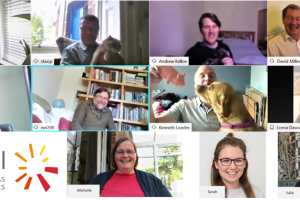
In this blog, we thought we’d let you know the latest developments from SEFARI Gateway, as we continue to work together even though we are currently physically apart.
For us, lockdown has really emphasized our love of nature (on daily walks, in the garden or by virtually meeting each other’s pets, now so much a part of the virtual meeting world!). Gateway’s work itself has been intensive. The strengths of our stakeholder partnerships and an adaptable approach to connecting across knowledge networks has hugely benefitted us and provided new ways to work.

In light of both climate change and the COVID-19 pandemic, the question of food security is increasingly important. Changes in rainfall and temperature, caused by climate change, will affect crop harvests and this could impact upon the availability and price of food. While the pandemic is also affecting the food system and this will include both the production and transportation of imported food from agricultural-producing countries. In this blog, we discuss plans that have these global issues in mind which could involve utilising tree waste for the benefit of human digestive health.

Are urban community food growing projects the answer to the problem of food poverty and the seemingly ever-increasing number of food banks? We conclude that they aren’t, but that they are an important response to wider challenges of poverty, loneliness, exclusion and a decline in community investment.
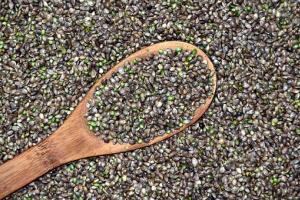
Facing current environmental emergencies, governments worldwide have set themselves ambitious targets to reduce greenhouse gas (GHG) emissions at national levels. Scotland is eager to make a pivotal contribution by setting a target of net-zero GHG emissions by 2045 and to reduce emissions by 75% by 2030. This calls for a holistic approach across industry, research, education, government, as well as changing individual behaviour. Increasing the extent of agriculture diversity could be a key component in agriculture’s response towards the mitigation of GHG emissions. In this blog we highlight how the emerging hemp industry has an innovative opportunity to contribute.
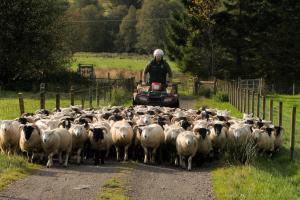
Over the last year, SEFARI has supported Food Standards Scotland deliver on a specific area of their food surveillance strategy: improving the use of data to identify trends and emerging issues so interventions can target more effectively areas of greatest risk. To do this, SEFARI has developed a bespoke opportunity through our fellowship scheme. SEFARI Fellowships allow for a member of staff to undertake a new knowledge exchange and impact role to facilitate the flow of research, knowledge and expertise to and from the Strategic Research Programme to our stakeholders. We are pleased that Neil Chalmers, the Rowett Institute is able to share more about his work and his experience of undertaking a SEFARI Fellowship.

Do you ‘eat to live’ or ‘live to eat’? Our individual relationship with food is complex, often changed by influences such as cost, availability or peer pressure. Our appetite, or the desire for food, is a major stimulus for eating but even this isn’t fixed and changes as we age. This is important because if you are thinking about your next meal or so busy that you forget to eat, appetite is what will influence our next food choice and we know that what we choose to eat affects our health, including our risk of heart disease, high blood pressure, type 2 diabetes and obesity.
Pagination
Blog

Following the success of the first ENRA Science, Evidence and Policy conference last year, the conference returned this year to provide a forum to discuss key cross cutting strategic issues affecting Scotland’s environment
